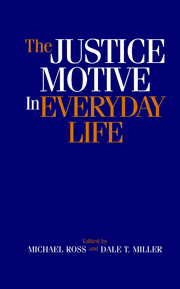Book contents
- Frontmatter
- Contents
- List of Contributors
- Introduction
- Theoretical Perspectives on the Justice Motive
- Victim Derogation and the Belief in a Just World
- 7 Why We Reject Innocent Victims
- 8 Helping and Rationalization as Alternative Strategies for Restoring the Belief in a Just World: Evidence from Longitudional Change Analyses
- 9 Violence in the Workplace – The Explanatory Strength of Social (In)Justice Theories
- 10 The Just World and Winston Churchill: An Approach/Avoidance Conflict about Psychological Distance When Harming Victims
- The Justice Motive and Prosocial Behavior
- Justice-Based Reactions to Transgressors
- Justice and Reaction to One's Own Fate
- Name Index
- Subject Index
8 - Helping and Rationalization as Alternative Strategies for Restoring the Belief in a Just World: Evidence from Longitudional Change Analyses
Published online by Cambridge University Press: 08 September 2009
- Frontmatter
- Contents
- List of Contributors
- Introduction
- Theoretical Perspectives on the Justice Motive
- Victim Derogation and the Belief in a Just World
- 7 Why We Reject Innocent Victims
- 8 Helping and Rationalization as Alternative Strategies for Restoring the Belief in a Just World: Evidence from Longitudional Change Analyses
- 9 Violence in the Workplace – The Explanatory Strength of Social (In)Justice Theories
- 10 The Just World and Winston Churchill: An Approach/Avoidance Conflict about Psychological Distance When Harming Victims
- The Justice Motive and Prosocial Behavior
- Justice-Based Reactions to Transgressors
- Justice and Reaction to One's Own Fate
- Name Index
- Subject Index
Summary
The need for justice is a core construct of Melvin Lerner's just world theory (Lerner, 1970, 1980). According to this theory, human beings want to believe that individuals get what they deserve and deserve what they get. They prefer to assume that bad deeds are punished and good deeds rewarded, and that good things happen to good people and bad things to bad people. The belief in just contingencies among character, behavior, and fate enables the person to maintain a sense of confidence and efficacy. If justice is a guiding principle in life, individuals can rely upon getting what they earn for their achievements and being respected for decency and moral integrity. This principle implies that they can prevent misfortune by conforming to social norms and ethical standards. Injustice threatens this belief system and motivates the person to engage in activities that either restore justice directly or help to maintain the belief in a just world by other means. According to Lerner and his colleagues, this can be accomplished by acting prosocially on behalf of the victim, or by cognitively restructuring the situation in such a way that it appears just (Lerner, 1980; Lerner & Miller, 1978; Lerner, Miller, & Holmes, 1976). Acknowledging injustice and actively fighting it, for example, by helping innocent victims or punishing victimizers, have been called action strategies.
- Type
- Chapter
- Information
- The Justice Motive in Everyday Life , pp. 127 - 148Publisher: Cambridge University PressPrint publication year: 2002
- 6
- Cited by



